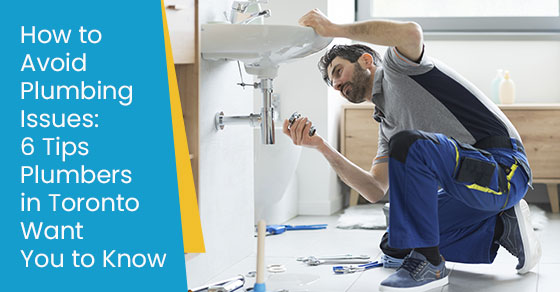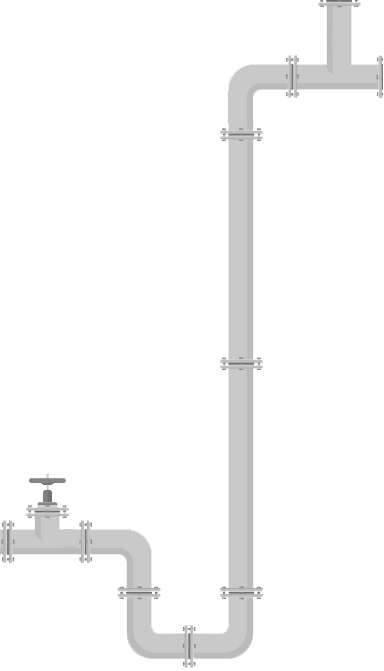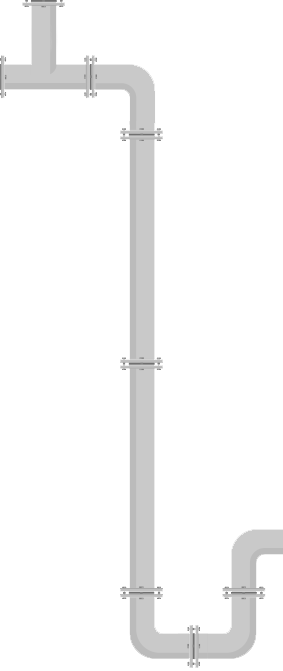How to Avoid Plumbing Issues: 6 Tips Plumbers in Toronto Want You to Know
Posted by Jason Genah on 06-08-2024

Of course, home maintenance goes beyond vacuuming the carpets and mopping the floors. While these are essential for keeping dirt away, there is much more to do to keep your home fresh and safe with help from plumbers in Toronto.
The plumbing in your home provides you with safe drinking water, clean water for washing your clothes and yourself daily, as well as hot water on demand. Thus, to maintain your plumbing system, there are some key things you should know and pay attention to as a homeowner.
1. Emergency water valves
Knowing how to turn off the water to parts of the home (or the entire home) should be one of the first things you look at when you move in.
Get acquainted with the water valves and their locations, and test them to make sure that they work. If they stick or appear flimsy, call a plumber to replace them and check the pipes.
Turning the water off in an emergency will save you time and money and reduce property damage.
2. Emergency numbers
Ask your neighbours in the area for the phone number of the plumber they use, or Google search for the best one that offers multiple services while providing an emergency call number.
This way, in the event you need an emergency plumber in Toronto, you are not trying to find this information while standing in fast-flowing water in the living room.
3. Check for leaks
If you hear dripping sounds in your home, you need to check all your faucets to ensure that you simply didn’t turn it off properly and that there are no leaks. Leaks in the home generate up to about 90 gallons of lost water per 10 homes per day—that’s a lot of water.
While a slow leak may not result in as much water loss, it can be a great indicator of a bigger problem starting to form. Therefore, identifying where the leak is coming from and calling a professional is crucial.
Drips can also form as a result of condensation from improperly insulated pipes in the basement. Take a cloth and wipe away any condensation build-up, and then check every 10–15 minutes to see if the problem recurs and how quickly.
Where there is water, there is the potential for leaks. Additionally, there is the potential for burst pipes where there is cold weather.
Check your pipes; what material are they made from? If they are plastic, then they are up to code, durable, and, in theory, leak-proof. Still, you should always check them after a major weather event such as a tornado, flooding, or other natural disaster.
Is there appropriate insulation to keep them warm in the winter and prevent them from freezing? Frozen pipes have the potential to burst, causing major flooding, damage, and financial headaches.
Slow leaks may just need a tightened valve, but a fast leak could spell disaster. Ensure to shut off the main water valve, check the surrounding area, and call the professionals, as your plumber in Toronto will have the tools and knowledge to fix the issue.
How to Avoid Leaks
Proper insulation of your pipes, particularly in the basement, will help to reduce condensation and freezing in the winter. This will also protect against burst pipes and flooding in the home.
If you find drips and leaks from faucets, make sure that the tap is fully turned off. Otherwise, you may need to replace the faucet or at least check to make sure that nothing has come loose.
4. The dreaded clog
We have all been in that situation where we go to the bathroom at someone else’s house and the toilet clogs. It’s embarrassing, but also quick to resolve.
Make sure you have a plunger nearby to help with toilet clogs. Just be certain to throw some towels on the floor first in case there is some overflow. Don’t panic, and plunge away.
For bathroom sinks, the most common reason for clogs is excess hair. With kitchen sinks, the problem is usually due to food particles, as well as oil and grease poured down the drain. A good drain cleaner or a natural concoction will remove the clog and get the water flowing again.
How to Avoid Clogs
For bathroom clogs, place hair-catchers over the drains in the bathroom sink, bathtub, and shower pan to catch hair and prevent it from entering the pipes. Just make sure to clean them after every use.
For the kitchen sink, try scraping food debris into the garbage or compost, not down the drain. Organic material tends to accumulate and, eventually, block the pipes. The same thing happens with grease and oil. Pour these into separate containers and toss them into the trash.
5. Inspect the water heater
If you have hot water available at all times in your home, that means you have a tank water heater in the basement.
When this appliance is working properly, you tend not to think about it. Still, the water heater can benefit from yearly maintenance and inspections. This allows you to keep the heater running efficiently and clear out any debris build-up that may occur inside.
If you want to look at more economical and environmentally friendly options, you can upgrade to a tankless system, but check with a professional plumber before making any drastic changes.
6. Prepare a plumbing first-aid kit
Fortunately, there are some plumbing issues you can fix without having to call a plumbing service. There are also things you can do to prevent a plumbing emergency from getting worse while you wait for a professional.
A simple household plumbing first aid kit that is easily accessible will make tense situations better. This kit should include the following:
- Tools
- Plumber’s tape
- Plunger
- Drain cleaner
- Cloth
- Flashlight
- A bucket
- A list of all water valve locations
Contact the Toronto Plumbing Experts
At Drain King Plumbers, we have been in business for over 15 years. Our plumbing professionals are fully trained, bonded, and insured. Thus, there is no question about why you should entrust our plumbers in Toronto with all your plumbing needs.
For any plumbing problems and your peace of mind, call the experts at 1-833-983-5663 or you can contact us online.




